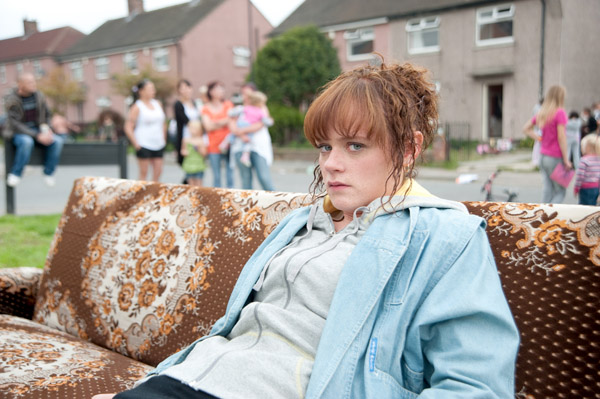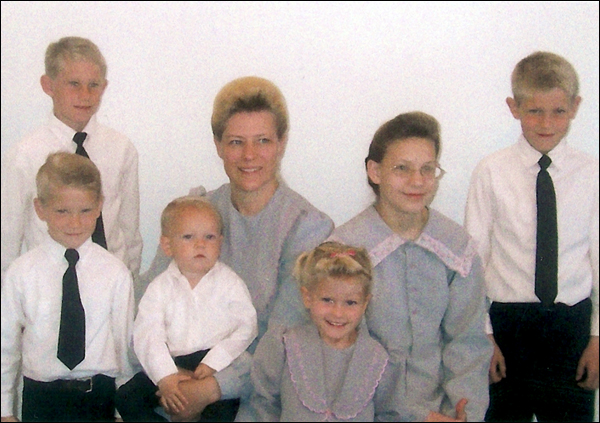|
Reviews of Recent Independent, Foreign, & Documentary Films in Theaters and DVD/Home Video

2010 Tribeca Film
Festival: Recommended Documentaries Intriguing documentaries, one of the strengths of the Tribeca Film Festival each year, fall into themed selections—families, the conflicts in the Middle East, the environment (the festival fell around Earth Day), sports, and celebrities. Families: Can’t Live With ’Em, Can’t Live Without ’Em Director Clio Barnard uses a startlingly creative documentary style in The Arbor to depict the wrenching story of Andrea Dunbar and her family. It was awarded best new documentary filmmaker by the festival jury. In the 1980’s, Dunbar’s three raw plays, including The Arbor and Rita, Sue and Bob Too (made into a 1987 film by Alan Clarke), updated working-class kitchen sink British drama to the sharp and frank viewpoint of a precocious young woman. But Dunbar’s verbal gifts couldn’t keep her from passing a family heritage of abuse and addiction onto the next generations, with her eldest daughter, Lorraine, and then Lorraine’s son bearing the brunt. Scenes from Dunbar’s semi-autobiographical plays are enacted like casual conversations, and with almost impenetrable Yorkshire accents, in the courtyard of the decaying Bradford housing project where she lived. From hours of interviews, the recorded voices of her grown children, parents, extended family, and neighbors—honest, deluded, contradictory, defensive, and chillingly matter-of-fact—are lip-synched by other actors in a style called “verbatim theatre.” This technique spares the uncomfortable intrusion of the nosy camera into extremely intimate details of lives torn asunder by drink, drugs, poverty, racism, violence, and too many pregnancies too early. Barnard reinterprets the biographical documentary as freshly as Agnès Varda reinvented autobiography with The Beaches of Agnès. Both emotional and clear-sighted, Earth Made of Glass personalizes how Rwanda is recovering from the 1994 genocide against the Tutsis. Director Deborah Scranton (The War Tapes) follows the obsessed, 15-year quest of Jean Pierre Sagahutu to find out how and where his father was killed and who murdered him. Rwanda’s unique gacaca courts of judgment and reconciliation (the village-based trials seen in Anne Aghion’s My Neighbor, My Killer) encourages personal confrontations and grudging confessions that allow for very dramatic closure. At the same time, Rose Kabuye, a close aide to the President Paul Kagame, is arrested abroad due to the international political crossfire when Kagame releases a detailed and scathing report on France’s complicity in the genocide. All the while, these three are challenged by how they will explain the genocide to the next generation. Their search for justice is inspiring.
As minors, they are still legally subject to their parents, regardless of the complicated family structures. If a man doesn’t sufficiently beat the devil out of their sons or disobeys the jailed but still controlling sect leader Warren Jeffs, his family can be transferred to another man. So it’s that much more startling how three teenagers ache for their former fundamentalist families, where sibling relationships have provided most of the stability and camaraderie in their lives. The boys are particularly anxious to rescue their sisters from their mothers’ lives of forced marriages and continuous pregnancies. As the detritus of fanaticism, these young peoples’ struggles to find themselves as individuals are heartbreaking. The travails of young pregnant women are the focus of the hour-long advocacy film No Woman No Cry by Christy Turlington Burns, who traveled around the world to examine preventable maternal mortality. The frightened wife in the slum of Bangladesh has a lot in common with the FLDS girls in Utah when she finally summons the strength to buck tradition to run away to the hospital in the middle of the night while in labor. Though the medical information provided is vague and sketchy, the stories of the individual pregnant women followed in Bangladesh, Florida, Guatemala, and Tanzania (where Burns turned her camera crew into ambulance drivers) are involving and beautifully filmed by cinematographer Kirsten Johnson (Pray the Devil Back to Hell). The talking-head experts lend more insight when they speak less about the centrality of mothers to families and more specifically of how medical professionals need to be sensitive to cultural issues. The Middle East: The People Far Behind the Headlines The olive orchards within the village of Budrus lie in the Occupied Palestinian Territories, right in the path of Israel’s planned expansion of its huge security wall. An instructive case study about community organizing in a tinderbox, Julia Bacha’s fascinating documentary, which garnered a special jury mention, follows step-by-step how villagers initiated protests and the very complex escalating actions, interactions, and reactions that resulted—grassroots leaders vs. career politicians, Israeli soldiers vs. Israeli peaceniks, Hamas vs. Fatah, nonviolent strategies vs. violent.
The Environment: In Man vs. Nature, Man Wins Danish director Michael Madsen’s Into Eternity is a very thoughtful (and darkly beautiful) look at where the practical meets the spiritual in protecting the environment—the storage of nuclear waste. He observes the construction of Finland’s first underground disposal facility for radioactive materials that must be sealed off for a hundred thousand years. The focus on the concrete engineering gives way to the philosophical and speculative to imagine the future and the humans who may stumble upon the tomb at that distant time. The first half of Thorkell Hardarson and Örn Marino Arnarson’s Feathered Cocaine is a revealing investigation of the addictive sport of falconry as practiced among the wealthy elite of the Persian Gulf states. The insatiable demand for falcons has had a horrific impact in the wild, like in the directors’ native Iceland. With an eccentric, repentant falcon breeder as an impassioned guide, they follow the illegal, multi-million dollar international trade. Stymied by official stonewalling, they become distracted by the other business deals that take place at the region’s huge falcon hunting camps—with terrorists, and then the directors spend more time uselessly hunting Osama Bin Laden than falcons. Into the Cold is categorized as part of the ESPN Sports Film Festival lineup, but director/photographer Sebastian Copeland’s striking images of the North Pole are far more arresting than his egotistical obsession with extreme adventuring. His trek to mark the centennial of Admiral Robert Peary’s arrival at the Pole challenges any simplistic stereotypes us couch potatoes may have about the top of the world. You can practically see the ice cap melt as he shows the startling changes in the ice above the Arctic Sea, which won’t be there for a bicentennial. Winter and summer surfing in downtown
Munich? Really—you can commute to this wave.
Keep Surfing
is Bjoern Richie Lob’s
valentine to his friends and visiting legends who popularized the sport
of river surfing that has spread around the world. Despite a shortage of
buff hunks who usually provide the ulterior reason to watch surfing
documentaries, and the headache-inducing, jumpy graphics,
the supportive community these quirky characters have created is a joy
to visit. Nora Lee Mandel Part Two: There's No Business like the Celebrity Business
|



